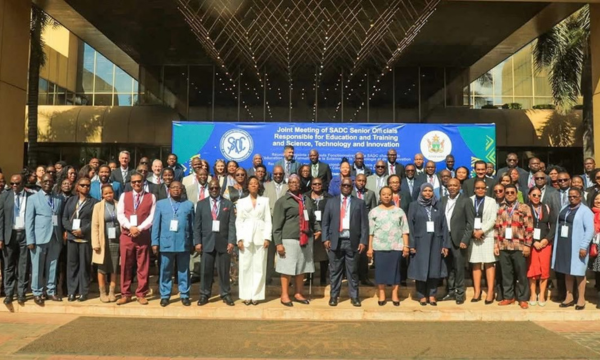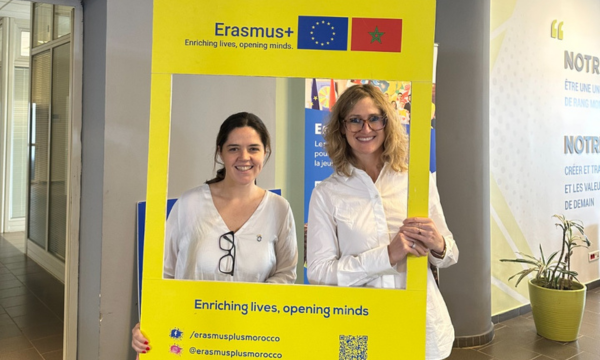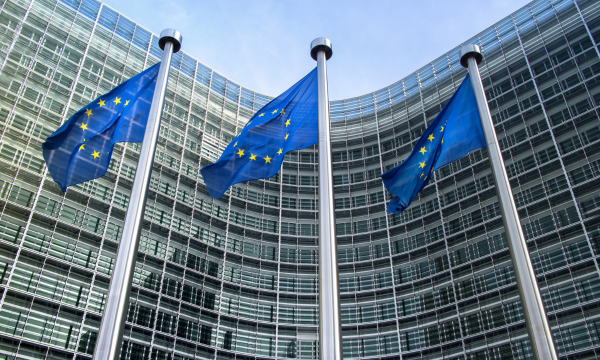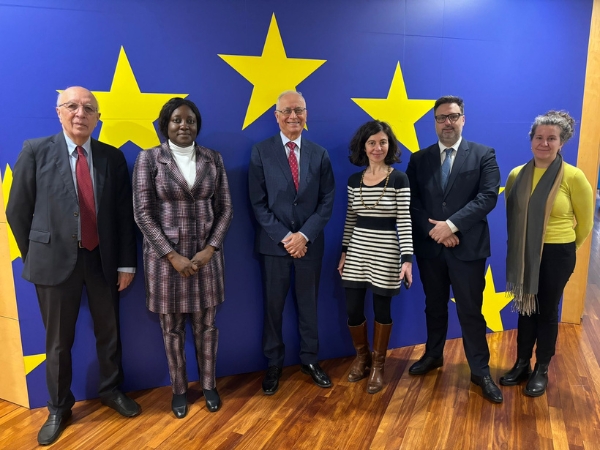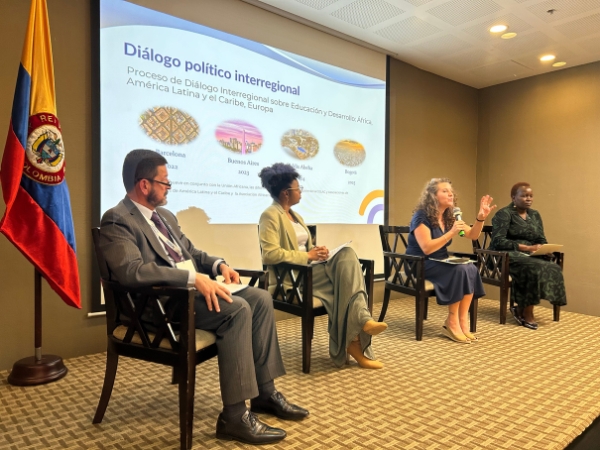The Interregional Dialogue on Education and Development between Latin America, the Caribbean and Africa was held in Buenos Aires, Argentina, from 28 to 31 March.
This event, organised by OBREAL Global in collaboration with the Ministry of Education of the Republic of Argentina and with the support of the African Union, brought together high-level representatives from the different regions involved in this dialogue, including government representatives from Latin America and the Caribbean, as well as representatives from the African Union, such as the Argentinean Minister of Education, Jaime Perczyk, the African Union Commissioner for Education, Science Technology and Innovation of the African Union, Mohammed Belhocine; the Minister of Education of Antigua and Barbuda, Daryll Matthew; the Director of Education and Cooperation at the Ministry of Higher Education, Research and Innovation of Senegal, Olivier Sagna; the Undersecretary of Education of Honduras, Jaime Rodríguez; the Secretary General of the Association of African Universities, Olusola Oyewole; and the Secretary of Higher Education Policy of Argentina, Oscar Alpa, among others.
The first day of the event took place at the Universidad Nacional del Noroeste de Buenos Aires – UNNOBA -, specifically at the Escuela de Ciencias Agrarias, Naturales y Ambientales.
The first debate was held in this space and focused on “Education, Food Security and Development” and was led by Elizabeth Kleinman, responsible for sustainable agri-food systems at the FAO, Aleandra Scafati, president of the Ecomujeres Foundation, and Jimena Estrella, innovation and development expert at OBREAL Global, and moderated by Virginia Pasquinelli, director of the Escuela de Ciencias Agrarias Naturales y Ambientes of UNNOBA.
The debate was preceded by a presentation by Olusola Oyewole, Secretary-General of the African Association of Universities, on “Africa’s Development Agenda: Vision 2063 and the challenges for African universities in relation to health and food security”.
The first day of the interregional dialogue ended with an institutional presentation of UNNOBA by its Rector, Guillermo Tamarit.
The second day took place at the headquarters of the Argentine Ministry of Education, the Palacio Sarmiento, where Andrea García, Secretary of Education Cooperation and Priority Actions of Argentina, welcomed all participants.
Mohammed Belhocine, Commissioner for Education, Science, Technology and Innovation of the African Union, opened the first panel discussion with a presentation entitled “South-South Cooperation / Africa, Latin America and the Caribbean. Challenges and Opportunities”.
This was followed by an intergovernmental dialogue which brought together the following speakers: Daryll Matthew, Minister of Education, Sports and Creative Industries of Antigua and Barbuda; Oscar Alpa, Secretary of Higher Education Policy of Argentina; Jaime Rodríguez, Undersecretary of Education of Honduras; Olivier Sagna, Director of Education and Cooperation, Ministry of Higher Education, Research and Innovation of Senegal; Alberto Armindo Tonela, National Director of Planning, Studies and Cooperation, Ministry of Education of Mozambique; Román García Báez, Advisor to the Ministry of Higher Education of Cuba; Rui Oppermann, Director of International Relations of CAPES (Brazil); Enrique Mammarella, President of the National Interuniversity Council of Argentina; Carlos Greco, Vice-President of the National Inter-University Council of Argentina; Olusola Oyewole, Secretary General of the African Association of Universities; Boaventura Aleixo, Rector of the Universidade Licungo (Mozambique); and Dinesh Bhatia, Ambassador of the Republic of India to Argentina. The round table was moderated by Óscar Domínguez, President of ENLACES.
This high-level discussion was followed by the signing of the Memorandum of Understanding between the Ministry of Education of the Republic of Argentina and the African Union Commission.
This cooperation agreement aims to lay the foundations for mutual cooperation in the field of education and to strengthen cooperation and development relations between Argentina and the African Union.
This cooperation agreement provides for various actions, including the exchange of best practices in the field of technical and vocational education and training, mutual technical assistance in regional integration processes and university cooperation, the development and implementation of joint research projects and the granting of scholarships for the training of human resources.
After this event, all participants of this interregional dialogue went to the Universidad Nacional de San Martín (UNSAM), where Wail Benjelloun, Honorary President of the Union of Mediterranean Universities, introduced the debate on research and development. The debate was led by Rui Oppermann (CAPES, Brazil), Ana Franchi (CONICET, Argentina) and Carlos Greco, Rector of UNSAM, and moderated by Pablo Beneitone, higher education policy expert at OBREAL Global.
The second day ended with the institutional presentation of the host university, UNSAM, by its Rector, Carlos Greco.
The final day of this interregional event took place at the Universidad Nacional de Hurlingham with a new debate, this time on education, work and development. The panel was composed of Gerardo Marchesini, Executive Director of the National Institute of Technological Education of the Ministry of Education of Argentina; Silvia Martínez, Professor of the Education and Work Seminar of the Masters in Educational Policy of UNAHUR; Carlos De Feo (CONADU); Daniel Ricci (FEDUN) and Walter Merkis (FATUN) and was moderated by Wail Benjelloun (UNIMED).
The event concluded with a panel discussion on perspectives on education cooperation and development from the South, featuring Olusola Oywole (AAU), Santiago Cafiero (Ministry of Education, Argentina), Mohamed Belhocine (African Union) and Jamie Perczyk (Minister of Education, Argentina).
Finally, Nicolás Patrici, OBREAL Global’s Strategy and Development Director, presented the conclusions of this important event.
“It is the responsibility of the different Souths to recognise each other. To rebuild paths and bridges, to meet again in common pasts, pains and challenges, in order to transform them into dreams, realities and aspirations for the future […]. In these days in which we have met in different languages and traditions, it has become clear that it is time to confront the homogenising discourses that, under the adjective “global”, dilute the richness of our diversity and distance themselves from the concrete and material lives of our citizens […] that development is intimately linked to education and that the actors that promote it must therefore be considered as more than just educational centres. […] that development is intimately linked to education and that the actors who promote it must therefore be considered as more than centres of knowledge generation, more than centres of teaching and learning, they must be considered as what they are: fundamental agents of development. […] This can only be done through concrete actions. And this requires public policies that articulate and fund common agendas for research, teaching, international cooperation and development that support new knowledge, new ways, that enable our citizens to think critically about new alternatives. That make development possible.”
RECORDINGS
The Interregional Dialogue was streamed live on YouTube. Here you can find all the recordings made in the different venues:
DAY 1: UNNOBA DAY 2: MINISTRY OF EDUCATION OF ARGENTINA DAY 2: UNSAM DAY 3: UNAHUR









